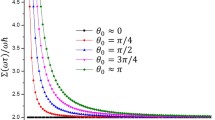Abstract
In nonadiabatic quantum search algorithm, it is difficult to calculate the success rate analytically. We develop the nonadiabatic quantum search algorithm by adding a counterdiabatic driving term to the original time-dependent Hamiltonian. The Hamiltonian we structured is diagonal in eigen picture and the time-independent Schrödinger equation is solved analytically. Then, we get an accurate analytical expression of success rate in nonadiabatic quantum search algorithm. Utilizing this expression, a sufficient condition, which can ensure the success rate be one with arbitrary evolution time, was found. Moreover, we can choose the better parameters by calculating the precise success rate according to the expression.




Similar content being viewed by others
References
Grover, L.K.: Quantum mechanics helps in searching for a needle in a haystack. Phys. Rev. Lett. 79(2), 325 (1997)
Boyer, M., Brassard, G., Høyer, P., Tapp, A.: Tight bounds on quantum searching. Fortschr. Phys. 46, 493 (1998)
Farhi, E., Goldstone, J., Gutmann, S., Siper, M.: Quantum Computation by Adiabatic Evolution. arXiv:quant-ph/001106 (2000)
Born, M., Fock, V.: Beweis des Adiabatensatzes. Z. Phys. 51, 165 (1928)
Mizel, A., Lidar, D.A., Mitchell, M.: Simple proof of equivalence between adiabatic quantum computation and the circuit model. Phys. Rev. Lett. 99(07), 070502 (2007)
Roland, J., Cerf, N.J.: Quantum search by local adiabatic evolution. Phys. Rev. A 65(04), 042308 (2002)
Sun, J., Lu, S.F., Liu, F.: Partial adiabatic quantum search algorithm and its extensions. Quantum Inf. Process. 12(8), 2689 (2013)
Oh, S., Kais, S.: Transitionless driving on adiabatic search algorithm. J. Chem. Phys. 141(22), 224108 (2014)
Hu, H.Y., Wu, B.: Optimizing quantum adiabatic algorithm. Phys. Rev. A 93(01), 012345 (2016)
Pérez, A., Romanelli, A.: Nonadiabatic quantum search agorithms. Phys. Rev. A 76(05), 052318 (2007)
Berry, M.V.: Transitionless quantum driving. J. Phys. A 42(36), 365303 (2009)
Chen, X., Lizuain, I., Ruschhaupt, A., Guéry-Odelin, D., Muga, J.G.: Shortcut to adiabatic passage in two- and three-level atoms. Phys. Rev. Lett. 105(12), 123003 (2010)
del Campo, A.: Shortcuts to adiabaticity by counterdiabatic driving. Phys. Rev. Lett. 111(10), 100502 (2013)
Torrontegui, E., Ibáñez, S., Martínez-Garaot, S., Modugno, M., Campo, A., Gué-Odelin, D., Ruschhaupt, A., Chen, X., Muga, J.G.: Shortcuts to adiabaticity. Adv. At., Mol. Opt. Phys. 62, 117 (2013)
Chen, Y.H., Xia, Y., Wu, Q.C., Huang, B.H., Song J.: Method for constructing shortcuts to adiabaticity by a substitute of counterdiabatic driving terms. Phys. Rev. A 93(05), 052109 (2016)
Grover, L.K.: Fixed-point quantum search. Phys. Rev. Lett. 95(15), 150501 (2005)
Das, S., Kobes, R., Kunstatter, G.: Energy and efficiency of adiabatic quantum search algorithms. J. Phys. A 36, 2839 (2003)
Roland, J., Cerf, N.J.: Quantum-circuit model of Hamiltonian search algorithms. Phys. Rev. A 68(06), 062311 (2003)
van Dam, W., Mosca, M., Vazirani, U.: How powerful is adiabatic quantum computation? In: Proc. 42nd IEEE Symposium on Foundations of Computer Science, pp. 279–287 (2001)
Cleve, R., Gottesman, D., Mosca, M., Somma, R.D., Yonge-Mallo, D.L.: Efficient discrete-time simulations of continuous-time quantum query algorithms. In: Proc. 41st ACM Symposium on Theory of Computing, pp. 409–416 (2009)
Hen, I.: Quantum gates with controlled adiabatic evolutions. Phys. Rev. A 91(02), 022309 (2015)
Santos, A.C., Sarandy, M.S.: Superadiabatic controlled evolutions and universal quantum computation. Sci. Rep. 5, 15775 (2015)
Coulamy, I.B., Santos, A.C., Hen, I., Sarandy, S.: Energetic cost of superadiabatic quantum computation. Front. ICT 3, 19 (2016)
Acknowledgments
This work was supported by the Natural Science Foundation of China (NSFC) under Grant No.11504430.
Author information
Authors and Affiliations
Corresponding author
Rights and permissions
About this article
Cite this article
Li, FG., Bao, WS., Li, T. et al. Nonadiabatic Quantum Search Algorithm with Analytical Success Rate. Int J Theor Phys 58, 939–949 (2019). https://doi.org/10.1007/s10773-018-3986-x
Received:
Accepted:
Published:
Issue Date:
DOI: https://doi.org/10.1007/s10773-018-3986-x




